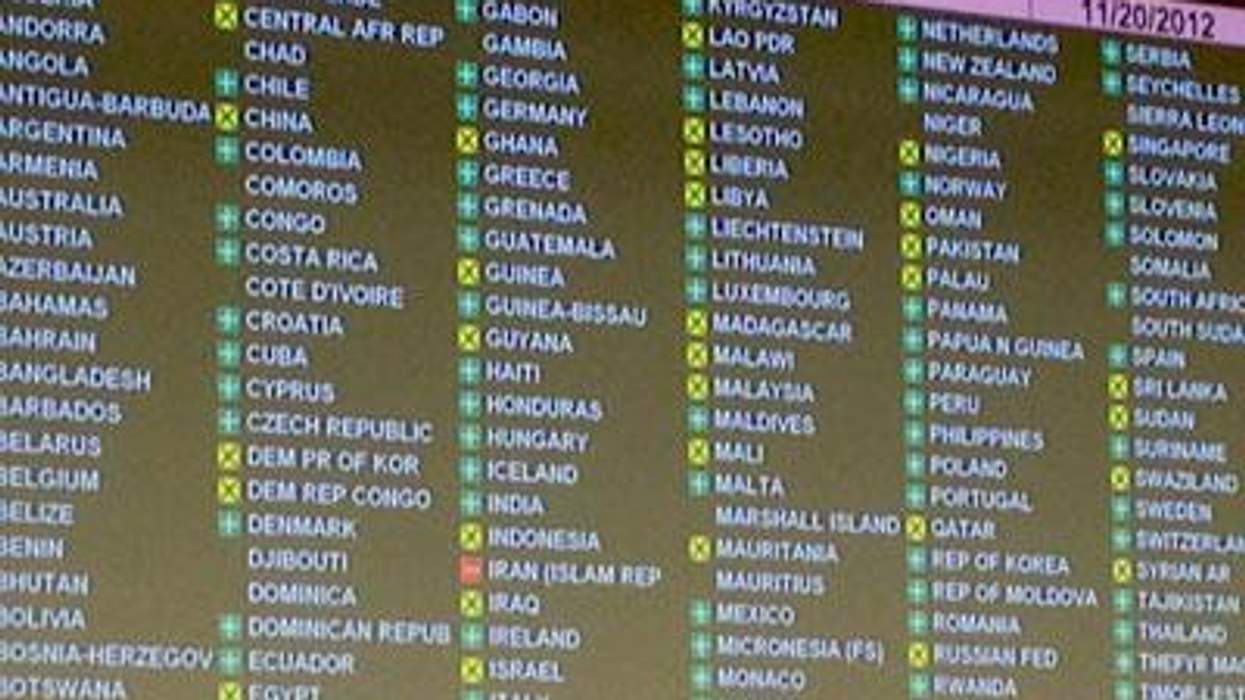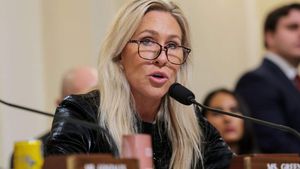A United Nations committee overseeing human rights issues approved a draft resolution Tuesday that for the first time acknowledges the need to protect individuals from extrajudicial executions on the basis of their gender identity.
The Third Committee of the General Assembly passed the resolution by a vote of 108 to 1, with 65 abstentions and 18 absences. Iran was the only country to oppose the resolution, which was approved after "rigorous debate" over the language, according to a United Nations news release.
Sweden introduced the resolution co-sponsored by 34 states. The text reiterates states' obligation to conduct prompt, comprehensive, and fair investigations into all suspected extrajudicial, arbitrary and summary executions, and urges states to investigate all killings, including those of people targeted for their sexual orientation, gender identity and other reasons.
The resolution on extrajudicial executions comes up for a vote in the committee every two years. Language to protect individuals on the basis of "sexual orientation" has been included for the past 12 years, but this year marked the first time the resolution has mentioned "gender identity."
Two years ago, the reference to "sexual orientation" was removed from the draft resolution following an effort led by a group of African states. The language was later restored in a vote in the General Assembly after a last-minute push coordinated by the United States.
Blocks of countries challenged the concept of rights based on sexual orientation and gender identity again this year. The United Arab Emirates sponsored an amendment on behalf of the Organization of the Islamic Cooperation that would have removed the language about sexual orientation and gender identity, but it was defeated by a vote of 86 to 44, with 31 abstentions and 32 absences. In a separate track, the Holy See led an effort that would have stripped references to all vulnerable groups, but the proposal was never formally introduced.
"In the debate during action on the texts, delegates voiced concerns about including concepts in resolutions that had no legal basis in international conventions," the U.N. reported. "Egypt's delegate said he was alarmed at attempts to create new rights or standards which seriously jeopardized the entire human rights framework. He therefore abstained in the vote."
The passage of the draft resolution mentioning gender identity caps two years of historic developments for LGBT human rights advocates at the United Nations. Last year, the UN Human Rights Council passed the first resolution endorsing the rights of LGBT people, inclusive of sexual orientation and gender identity.
Susan Rice, the U.S. ambassador to the United Nations, said the vote on the draft resolution on extrajudicial killings aligned with her country's efforts to ensure that "human rights protections continue to be extended to all, regardless of who they are or whom they love." Rice, a top candidate to succeed Hillary Clinton as Secretary of State, led the effort to reinsert the language on sexual orientation into the resolution in 2010.
"It is fitting, on National Transgender Day of Remembrance, that the Third Committee agreed to acknowledge protections from extrajudicial, summary, or arbitrary executions on the basis of gender identity for the very first time," she said in a statement.
"Two years ago, the General Assembly overwhelmingly voted to reinsert language on sexual orientation to this very resolution, and, since that time, the U.N. Human Rights Council has affirmed that all human rights apply to everyone, regardless of their sexual orientation or gender identity," added Rice. "The United States will fight to ensure that the remarkable progress the U.N. has made on LGBT issues in the last four years is not rolled back. Today's vote on gender identity is evidence that we are, in fact, expanding international support and moving forward."
International LGBT human rights advocates made the inclusion of the gender identity language a top priority this year. Jessica Stern, the executive director of the International Gay and Lesbian Human Rights Commission, said her organization and its partner groups had prepared for a strenuous fight over the issue, but no such battle emerged.
Stern told The Advocate the atmosphere appeared to have changed in the past two years, where recent advances laid groundwork that made the passage of the draft resolution possible. Notably, Japan became the first member of the Asian group of nations to speak in favor of LGBT rights during the vote.
"It took very little work from us to help bring about those statements," said Stern. "The environment is primed. The states are ready for this."
On the other hand, she said the Philippines, which abstained from the vote on the amendment to remove the sexual orientation and gender identity language, delivered a "disappointment." The country had pledged during a recent meeting in Geneva to lead on LGBT human rights issues. Advocates from the Philippines have been trying to pass anti-discrimination legislation in their country.
The vote on the draft resolution is expected to be final because the measure passed. When it next comes up for a vote in 2014, opponents could once again attempt to remove the sexual orientation and gender identity language.
Stern said the while a resolution denouncing killings outside the law may sound like it sets a "low bar," the measure establishes a baseline of consensus among states and informs the work of the UN's Special Rapporteur on extrajudicial, summary or arbitrary executions. She said her organization was still studying how the resolution would affect its partner groups working on the ground. The resolution is not legally binding and it does not impose financial repercussions on violators.
"To fight for recognition for the right to life is the lowest bar, but if we don't know where the floor is, how can we reach the ceiling?" she said.
Partner groups working around the world hailed the resolution in a joint statement released by IGLHRC.
"The passage of this resolution is the recognition that the lives and dignity of trans people (transsexual, transgender, transvestite and intersex) and of lesbian, gay and bisexual people cannot continue to be taken with impunity," said Andres Rivera Duarte, director of the Organizacion de Transexuales por la Dignidad de la Diversidad in Chile. "Today people are executed and/or murdered because of their sexual orientation and gender identity, which is an aberration we should be ashamed of as a society and as human beings. Today, states have spoken. They have recognized that life is a right and that they have the responsibility to protect it regardless of an individual's sexual orientation and gender identity. Today the work of civil society has paid off, and we can move forward continuing to advance rights."




































































Charlie Kirk DID say stoning gay people was the 'perfect law' — and these other heinous quotes